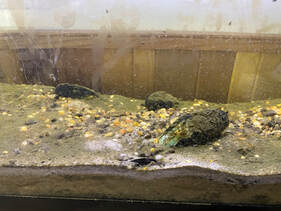CONSERVATION CORNER
A weekly blog for all things conservation
 Cole Sutton, Mansfield University Student, BCCD Intern What are mussels? Freshwater bivalves, commonly known as mussels, belong to the order Unionoida and are found on every continent except Antarctica. Bivalve means having two sides or shells. They inhabit lakes, ponds, creeks, and rivers. Mussels’ main food source is algae. They obtain algae by filtering or straining the water; Along with filtering out food they also filter out heavy metals and dirt particles in the water. Nonedible particles are deposited into the ground rendering clearer water. There are approximately 50 species of mussels that reside in Pennsylvania. However, 12 species have already been extirpated, which means that they are no longer found in the state. The cause of the mussel decline is due to the alteration of flow in waterways. The alteration in flow is detrimental to mussels because the blockade in the water way halts migrating fish. Mussels use migrating fish such as American Eels to disperse and house their larvae before hatching. Dams also change the substrate or stream bottom above and below. This change could leave an inhabitable area for mussels after the dam is put in. Along with dams, the introduction of negative water quality from mining, pharmacology, and global water change has increased.
But why are these rock-like organisms important to us? The answer is they clean our water with absolutely no cost. One mussel can filter 15 gallons of water. This might not seem like a drastic change, however one healthy mussel bed contains thousands of mussels. They even filter microplastics and harmful heavy metal out of the water which in turn helps the entire ecosystem. Enhancing water quality and clarity increases the amount of light that can reach aquatic plants. Aquatic plants introduce oxygen into the water and use the harmful nitrates produced by fish. The water quality also benefits fish such as bass, bluegill, and baitfish. Overall, a healthy population of mussels will help any body of water. How can you help? You can help by supporting your local Eels in the classroom project. Nearly every school district in Bradford County has eels in the classroom currently. Mussels need the eels to reproduce, and the eels need the water cleaning abilities of the mussels. (A match made in Heaven) The eels are raised and integrated into the curriculum. They are then released into the Susquehanna River to help the Eel and mussel populations. Also, it would be a great help if you could spread awareness of how important mussels are. This could be as simple as telling a friend or neighbor and sparking some interest in someone. The decline of mussels is just starting to be studied and the upcoming generation may be responsible for replenishing the mussel population and helping our water. I personally have been studying freshwater mussels at Mansfield University and barely knew anything about them only 6 months ago. Thank you for reading! Keep using natural resources wisely. The Bradford County Conservation District is committed to helping people manage resources wisely. You can visit the Bradford County Conservation District at 200 Lake Rd in Wysox across from the Wysox Fire Hall. Contact us at (570) 485-3144 or visit our web page at www.bccdpa.com.
0 Comments
Leave a Reply. |
AuthorsVarious staff at the Bradford County Conservation District Archives
July 2024
Categories
All
|
|
Bradford County Conservation District
Stoll Natural Resource Center 200 Lake Road, Suite E | Towanda PA 18848 Phone: (570)-485-3144 |
